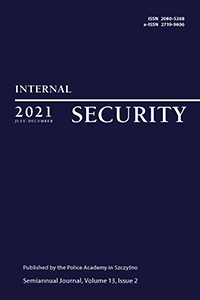Legal and Axiological Basis for Social Reintegration of Persons Sentenced to Imprisonment and Public Participation in the Process
Legal and Axiological Basis for Social Reintegration of Persons Sentenced to Imprisonment and Public Participation in the Process
Author(s): Przemysław TarwackiSubject(s): Social Sciences, Law, Constitution, Jurisprudence, Criminal Law, Sociology, Sociology of Law
Published by: Akademia Policji w Szczytnie
Keywords: social reintegration of convicts; rehabilitation; persons deprived of liberty; social exclusion; the European Social Fund
Summary/Abstract: The article discusses the problem of social reintegration of prisoners, which — despite being repetedly raised in therelevant literature — remains to be a point of issue. In the light of a recent survey by the Polish Public Opinion Research Centre,former convicts are seen by the Polish society among groups most at risk of social exclusion. In turn, a report on convicted adultsby the Ministry of Justice of 2020 shows that many ex-convicts return to crime in the first year after being released, whichnegatively affects the internal security of our country. This encourages one to rethink social reintegration of convicts and to searchfor additional arguments in favour of extending special support to them. Although the existing legislation allows for unlimitedapplication of the principle of individualised assistance for social readaptation of convicts, the circle of persons who can ingagein social readaptation of inmates during their imprisonment is strictly limited. Excluding from this circle all persons validlyconvicted of intentional offences is unjustified and downright unlawful, being contrary to higher-order legal acts. An analysisof the applicable law shows that the constitution itself contains arguments for not treating this group differently from otherindividuals most at risk of social exclusion. A review of lower-order legal acts points out that following Poland’s accession to theEU there appeared new measures and additional reasons, different from those traditionally identified in the doctrine of executivecriminal law, to invest in any human capital in need of support, including prisoners
Journal: Internal Security
- Issue Year: 13/2021
- Issue No: 2
- Page Range: 39-54
- Page Count: 16
- Language: English

